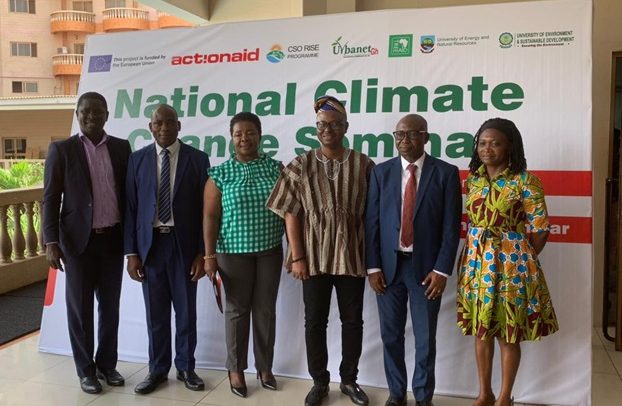Some officials of the summit
COUNTRY DIRECTOR Of ActionAid Ghana, John Nkaw, has called for the establishment of an international financing facility to help the most vulnerable countries recover and rebuild in the aftermath of climate disasters.
“We need to be relentless in our call for climate justice,” he said during the national climate change seminar held in Accra yesterday.
Mr. Nkaw indicated that although it is heartwarming for highly industrialised countries who have contributed the largest share towards climate change to be at the forefront of highlighting the effects of climate change, “this may not be far reaching enough towards building climate resilience!
“What is essential at this critical point is for the wealthy and polluter nations to pay up for the climate-induced Losses and Damages suffered by the most vulnerable in many poor countries due to no fault of theirs,” he said.
Mr. Nkaw explained that the net effect of ongoing climate change was affecting agricultural production, while the sector also presents emissions reduction opportunities.
He indicated that a World Bank report on Ghana’s Climate Risk profile revealed that the country would continue to get warmer, with mean temperatures projected to increase by 1.0°C to 3.0°C by mid-century and by 2.3°C to 5.3°C by the end of the century.
The report also noted that the projected warming would likely occur more rapidly in the northern and inland areas of Ghana.
“These changes have impacted negatively on people living in poverty and exclusion, who are particularly vulnerable to deviations in average climate conditions such as prolonged drought and natural disasters such as floods, thereby undermining the sustainability of their livelihoods in the long term,” he said.
He thus called for a collective action to prevent a further increase in the poverty gap.
EU Funded NGIDP
The ActionAid boss said the organisation received European Union funding to build the resilience of smallholder farmers against climate-induced loss and damage.
The fund is also to increase income levels of women and young people through processing non-timber forest products, agricultural value chain business, and social enterprises.
“It will also increase access to quality social protection schemes for people living in poverty in rural agrarian areas. And ensure gender-responsive decent work principles are integrated into national and regional agricultural employments, programmes and policies,” he said.
Vice Chancellor, University of Energy and Natural and Natural Resources Professor Elvis Asare-Bediako speaking on the theme, “Building Climate Resilience in Ghana through Multi-stakeholder collaboration” said climate change threatened people with food insecurity, water scarcity, flooding, infectious diseases, extreme heat, economic losses, and displacement.
He, thus, noted that even if efforts to minimise future warming were successful, some effects would continue for centuries, including rising sea levels, rising ocean temperatures, and ocean acidification.
“It is important to note, however, that adaptation alone cannot avert the risk of “severe, widespread and irreversible” impacts.
He, thus, reiterated the call for developed nations to increase its funding support to vulnerable countries to enable them mitigate the effects of climate change.
BY Jamila Akweley Okertchiri


